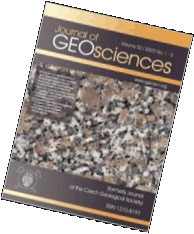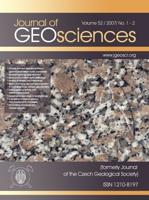 Export to Mendeley
Export to MendeleyOriginal paper
Molybdenum isotopic composition of molybdenite and the fertility potential of the Ekomédion U–Mo prospect, SW Cameroon
Journal of Geosciences, volume 67 (2022), issue 4, 331 - 344
DOI: http://doi.org/10.3190/jgeosci.363
We present Mo isotope data for molybdenite from the Ekomédion U-Mo prospect, SW Cameroon, a Late Neoproterozoic granite-pegmatite-quartz vein system. Disseminated and veinlet-controlled molybdenite in granite and pegmatitic pods yields a narrow range of δ98Mo values from -0.06 to +0.24 ‰, with two overlapping populations of +0.03 ± 0.07 ‰ (n = 4) in granite, and slightly heavier of +0.11 ± 0.10 ‰ (n = 5) in pegmatite. By contrast, molybdenite from a quartz-muscovite vein has an isotopically heavy δ98Mo value of +1.61 ‰. We interpret this trend from granite through pegmatite to vein system towards isotopically heavy Mo to reflect the fractionation of an evolving magmatic-hydrothermal system. Furthermore, the LREE-enriched bulk-rock patterns with largely negative Eu anomalies and the overall enrichment of HREE in zircon indicate plagioclase fractionation as the dominant petrogenetic process during melt evolution. Furthermore, the presence of accessory ilmenite indicates relatively reducing conditions of the melt system, unfavorable for significant Mo accumulation. Therefore, the Ekomédion granite system seems to have limited economic potential for molybdenum despite the advanced degree of magmatic evolution.
Webdesign inspired by aTeo. Hosted at the server of the Institute of Petrology and Structural Geology, Charles University, Prague.
ISSN: 1803-1943 (online), 1802-6222 (print)
email: jgeosci(at)jgeosci.org


IF (WoS, 2022): 1.4
5 YEAR IF (WoS, 2022): 1.8
Policy: Open Access
ISSN: 1802-6222
E-ISSN: 1803-1943